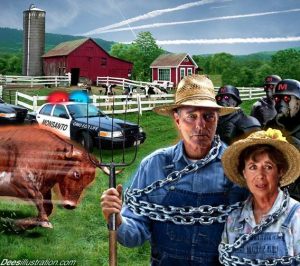Written by: Marti Oakley – Proud Political Junkie’s Gazette
 A decision by U.S. District Judge Rosemary Collyer, located in the Washington District of Criminals, throwing out a lawsuit brought by Farm to Consumer Legal Defense Fund (FCLDF) asking the court to halt the implementation of NAIS, was based on her assertion that there is no federal law and/or, no federal regulation ordering the implementation of the National Animal Identification System (NAIS). FCLDF brought the suit asking for temporary injunctive relief……a move that was good in its intentions but obviously filed too early. As no law or regulation exists to authorize NAIS/Premises ID and the claims by USDA and Tom Vilsack go unsubstantiated despite repeated requests to produce the authority they claim, injunctive relief could not be granted as no law has been passed…yet,….although multiple legislative assaults are in the works.
A decision by U.S. District Judge Rosemary Collyer, located in the Washington District of Criminals, throwing out a lawsuit brought by Farm to Consumer Legal Defense Fund (FCLDF) asking the court to halt the implementation of NAIS, was based on her assertion that there is no federal law and/or, no federal regulation ordering the implementation of the National Animal Identification System (NAIS). FCLDF brought the suit asking for temporary injunctive relief……a move that was good in its intentions but obviously filed too early. As no law or regulation exists to authorize NAIS/Premises ID and the claims by USDA and Tom Vilsack go unsubstantiated despite repeated requests to produce the authority they claim, injunctive relief could not be granted as no law has been passed…yet,….although multiple legislative assaults are in the works.
I guess this statement in her opinion would answer the question posed to Tom Vilsack and other officials from the USDA, demanding to know under what authority or law NAIS is being implemented and is scheduled to become mandatory. Turns out, according to Judge Collyer…there is none. It would also answer the question as to why Mr. Vilsack nor the USDA will respond to the question or even acknowledge it has ever been asked.
It is apparent from this ruling there is no legal, lawful, legislative regulation or statute which allows, establishes or mandates NAIS. The USDA, using its so-called “rule-making” authority, which is nothing less than illegal law enacted by a non-elected bureaucracy, has simply been the tool to by-pass constitutional rights and liberties in an effort to expand the power and control of not only the agency itself, but also the federal government which has long since exceeded its Constitutional authority and power on many levels.
Since the court has ruled in this way, does this not make the bribes paid to state officials to “voluntarily” implement NAIS , euphemistically called [cooperative agreements]..an act of collusion? Wouldn’t this also make refusal to comply with state enacted mandates, for which the Judge herself has admitted, there is no lawful basis, a legal protection for farmers and ranchers? And would this not also include the prohibition on the SWAT team-like assaults being perpetrated in states like Wisconsin which accepted one of the USDA’s multi-million dollar bribes to do a test run on NAIS/Premises ID?
The judge also seemed not to be concerned about the impending loss of private property rights which is an intended result of NAIS/Premises ID; apparently having no judicial problem with livestock owners being referred to as [stakeholders, legally implying they have an interest in but are not the owners of their own property] and land owners relegated to the category of [tenants or managers] again removing them from the rightful legal ownership of the land.
Judge Collyer’s expert legal opinion went on to say that NAIS is “an identification and tracking program developed by the U.S. Department of Agriculture and adopted by state agriculture departments voluntarily”. This is a patently false statement by the court. USDA DID NOT develop the NAIS or Premises ID program. USDA is simply trying to codify into law Codex Alimentarius and all of its international regulations and standards of which NAIS/Premises Id is a key feature.
Again, paying bribes to state officials to implement what the Judge herself identifies as a non-existence law or regulation should have warranted the halting of any programs regardless of what non-elected agency had launched them into the public domain on behalf of Bio-tech and Codex Alimentarius.
“Collyer continued with….”They, however, completely fail to address Michigan state law, which authorizes the director of MDA to adopt programs such as NAIS compliance for cattle, and plaintiffs’ reliance on federal law is misplaced.” The Judge does not admit or allude to the fact that Michigan would not have enacted this law without federal interference or encouragement.
The Judge seemed not to consider that Michigan officials had illegally entered into an agreement with USDA, which was the catalyst for the Michigan law, and had accepted monetary assistance, cooperative funding or what is in my opinion, legalized bribery to do so.
The Judge seemed not to be aware of a precedence, (a judicial concept continually invoked by courts when their intended rulings are in conflict with actual law) or, as in this instance totally ignored by the court as it would have rendered the ruling void, which states:
“The general misconception is that any statute passed by legislators bearing the appearance of law constitutes the law of the land. The Constitution of the United States is the supreme law of the land, and any statue, to be valid, must be in agreement. It is impossible for both the Constitution and a law violating it to be valid; one must prevail. This is succinctly stated as follows: The general rule is that an unconstitutional statute, though having the form and name of law, is in reality no law, but is wholly void, and ineffective for any purpose; since unconstitutionality dates from the time of its enactment, and not merely from the date of the decision so branding it. An unconstitutional law, in legal contemplation, is as inoperative as if it had never been passed. Such a statute leaves the question that it purports to settle just as it would be had the statute not been enacted.”
“Since an unconstitutional law is void, the general principals follow that it imposes no duties, confers no rights, creates no office, bestows no power or authority on anyone, affords no protection, and justifies no acts performed under it.. A void act cannot be legally consistent with a valid one.
An unconstitutional law cannot operate to supersede any existing valid law. Indeed, insofar as a statute runs counter to the fundamental law of the land, it is superseded thereby. No one is bound to obey an unconstitutional law and no courts are bound to enforce it.”
Sixteenth American Jurisprudence, Second Edition, Section 177. (late 2nd Ed. Section 256)
It seems apparent that precedence is only advantageous when it does not conflict with intended encroachment by the government or its agencies.
Although the above opinion is by far not the only opinion of the Courts regarding the illegality of states agreeing to the implementation of what are obviously assaults on constitutional rights and protections, it is the most powerful.
Kudos to Farm to Consumer Legal Defense Fund for having the courage to mount this lawsuit.
© 2009 Marti Oakley



